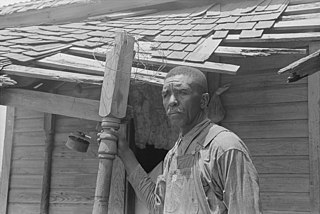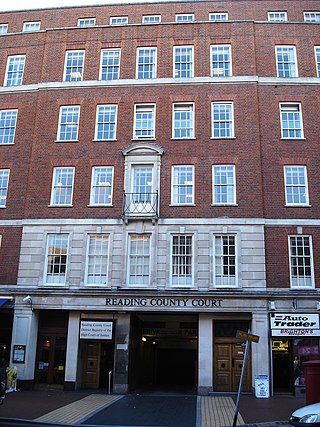The Independent Irish Party (IIP) was the designation chosen by the 48 Members of the United Kingdom Parliament returned from Ireland with the endorsement of the Tenant Right League in the 1852 general election. The League had secured their promise to offer an independent opposition to the dominant landlord interest, and to advance an agrarian reform programme popularly summarised as the "three F's": fair rent, fixed tenure and free sale.

Enclosure or inclosure is a term, used in English landownership, that refers to the appropriation of "waste" or "common land" enclosing it and by doing so depriving commoners of their rights of access and privilege. Agreements to enclose land could be either through a formal or informal process. The process could normally be accomplished in three ways. First there was the creation of "closes", taken out of larger common fields by their owners. Secondly, there was enclosure by proprietors, owners who acted together, usually small farmers or squires, leading to the enclosure of whole parishes. Finally there were enclosures by Acts of Parliament.

A tenant farmer is a person who resides on land owned by a landlord. Tenant farming is an agricultural production system in which landowners contribute their land and often a measure of operating capital and management, while tenant farmers contribute their labor along with at times varying amounts of capital and management. Depending on the contract, tenants can make payments to the owner either of a fixed portion of the product, in cash or in a combination. The rights the tenant has over the land, the form, and measures of payment vary across systems. In some systems, the tenant could be evicted at whim ; in others, the landowner and tenant sign a contract for a fixed number of years. In most developed countries today, at least some restrictions are placed on the rights of landlords to evict tenants under normal circumstances.

The Irish National Land League, also known as the Land League, was an Irish political organisation of the late 19th century which organised tenant farmers in their resistance to exactions of landowners. Its primary aim was to abolish landlordism in Ireland and enable tenant farmers to own the land they worked on. The period of the Land League's agitation is known as the Land War. Historian R. F. Foster argues that in the countryside the Land League "reinforced the politicization of rural Catholic nationalist Ireland, partly by defining that identity against urbanization, landlordism, Englishness and—implicitly—Protestantism." Foster adds that about a third of the activists were Catholic priests, and Archbishop Thomas Croke was one of its most influential champions.
The Inclosure Acts created legal property rights to land previously held in common in England and Wales, particularly open fields and common land. Between 1604 and 1914 over 5,200 individual acts enclosing public land were passed, affecting 28,000 km2.
The Land Acts were a series of measures to deal with the question of tenancy contracts and peasant proprietorship of land in Ireland in the nineteenth and twentieth centuries. Five such acts were introduced by the government of the United Kingdom between 1870 and 1909. Further acts were introduced by the governments of the Irish Free State after 1922 and more acts were passed for Northern Ireland.

Crofting is a form of land tenure and small-scale food production particular to the Scottish Highlands, the islands of Scotland, and formerly on the Isle of Man. Within the 19th-century townships, individual crofts were established on the better land, and a large area of poorer-quality hill ground was shared by all the crofters of the township for grazing of their livestock. In the 21st century, crofting is found predominantly in the rural Western and Northern Isles and in the coastal fringes of the western and northern Scottish mainland.
The Irish Land Commission was created by the British crown in 1843 to "inquire into the occupation of the land in Ireland. The office of the commission was in Dublin Castle, and the records were, on its conclusion, deposited in the records tower there, from whence they were transferred in 1898 to the Public Record Office". It took on the role of a rent fixing commission in 1881 under the Land Law (Ireland) Act 1881. For a century it was the body responsible for re-distributing farmland in most of Ireland. It was formally abolished in 1999.
The Napier Commission, officially the Royal Commission of Inquiry into the Condition of Crofters and Cottars in the Highlands and Islands was a royal commission and public inquiry into the condition of crofters and cottars in the Highlands and Islands of Scotland.
Tenant-right is a term in the common law system expressing the right to compensation which a tenant has, either by custom or by law, against his landlord for increment at the termination of his tenancy.

The Land War was a period of agrarian agitation in rural Ireland that began in 1879. It may refer specifically to the first and most intense period of agitation between 1879 and 1882, or include later outbreaks of agitation that periodically reignited until 1923, especially the 1886–1891 Plan of Campaign and the 1906–1909 Ranch War. The agitation was led by the Irish National Land League and its successors, the Irish National League and the United Irish League, and aimed to secure fair rent, free sale, and fixity of tenure for tenant farmers and ultimately peasant proprietorship of the land they worked.
The Tenant Right League was a federation of local societies formed in Ireland in the wake of the Great Famine to check the power of landlords and advance the rights of tenant farmers. An initiative of northern unionists and southern nationalists, it articulated a common programme of agrarian reform. In the wake of the League's success in helping return 48 pledged MPs to the Westminster Parliament in 1852, the promised unity of "North and South" dissolved. An attempt was made to revive the all-Ireland effort in 1874, but struggle for rights to the land was to continue through to the end of the century on lines that reflected the regional and sectarian division over Ireland's continued place in the United Kingdom.

An assured tenancy is a legal category of residential tenancy to an individual in English land law. Statute affords a tenant under an assured tenancy a degree of security of tenure. A tenant under an assured tenancy may not be evicted without a reasonable ground in the Housing Act 1988 and, where periodic changes in rent are potentially subject to a challenge before a rent assessment committee.

Agriculture in the United Kingdom uses 69% of the country's land area, employs 1% of its workforce and contributes 0.5% of its gross value added. The UK currently produces about 60% of its domestic food consumption.

The Agricultural Holdings Act 1995 is an Act of the Parliament of the United Kingdom which applies to England and Wales. It is in force. The Act reformed and substantially deregulated the law relating to agricultural tenancies, and has had the dual effects of increasing the amount of land available to rent in the agricultural sector, and increasing the average rent per acre charged.
The history of rent control in England and Wales is a part of English land law concerning the development of rent regulation in England and Wales. Controlling the prices that landlords could make their tenants pay formed the main element of rent regulation, and was in place from 1915 until its abolition by the Housing Act 1988.
Compulsory purchase is the power to purchase rights over an estate in English land law, or to buy that estate outright, without the current owner's consent. In England and Wales, Parliament has granted several different kinds of compulsory purchase power, which are exercisable by various bodies in various situations. Such powers are meant to be used "for the public benefit". This expression is interpreted broadly.

The Landlord and Tenant (Ireland) Act 1870 was an Act passed by the Parliament of the United Kingdom in 1870.
The Evesham Custom is a distinctive form of customary leasehold tenure used in the market gardens of Evesham, Worcestershire. It is the most well-known of a number of former local practises, such as the Ulster Custom and North Lincolnshire Custom. The underlying principle of such customs was that the tenant could be granted compensation for any improvements they made to the land they leased, since the common law did not provide any such protection.

The Agricultural Holdings (England) Act 1875 was an Act of the Parliament of the United Kingdom passed by Benjamin Disraeli's Conservative government.










